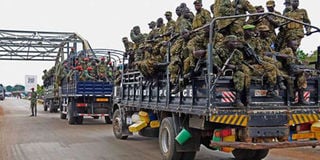South Sudan opposition 'deposes' leader Riek Machar

Uganda military personnel drive towards Juba, South Sudan, from Nimule border point on July 14, 2016. Machar asked for a buffer between his forces and those loyal to Kiir as an assurance of his security in the capital. PHOTO | AFP
What you need to know:
- Gai, a former governor of Unity State in South Sudan, was SPLM-IO’s lead negotiator for an agreement signed last year in August between Machar and President Kiir, as well as several other political groups, to end three years of violence.
- But the fresh disharmony began with an ultimatum on Thursday by President Kiir to Machar, requiring him to report back to Juba by Saturday evening to continue serving as the first vice president.
A section of South Sudan's former rebels Sunday announced they had replaced their leader Riek Machar with chief negotiator as first vice president, plunging the government into further infighting.
But Machar argued the move to substitute him with Taban Deng Gai, the chief negotiator for the Sudan People’s Liberation Movement in Opposition (SPLM-IO), was illegal since the latter had defected.
“The position taken by the few defected SPLM-IO officials is illegal and not approved by the IO leadership. This is cooked by (President Salva) Kiir and (Chief of General Staff Paul) Malong to kill the peace agreement,” Machar’s representative in Nairobi, Lam Jok, told the Nation.
Gai, a former governor of Unity State in South Sudan, was SPLM-IO’s lead negotiator for an agreement signed last year in August between Machar and President Kiir, as well as several other political groups, to end three years of violence.
The deal created a transitional government to last 30 months in which Kiir was to remain president and Machar his first vice president.
Both sides were to retain control of their armies until a merger is concluded.
But the fresh disharmony began with an ultimatum on Thursday by President Kiir to Machar, requiring him to report back to Juba by Saturday evening to continue serving as the first vice president.
But Machar failed to comply and hence a group of SPLM-IO officials, including Gai, secretary-general Dhieu Diing and deputy chairman Alfred Gore met in Juba and nominated Gai as Machar’s replacement.
Machar had fled Juba two weeks ago following renewed clashes in which 300 people were killed.
Machar asked for a buffer between his forces and those loyal to Kiir as an assurance of his security in the capital.
STILL IN CHARGE
The situation was complicated when he announced on Friday that he had fired Gai as mining minister, removed him from the SPLM-IO political bureau and withdrawn his chairmanship of the National Committee on Reconciliation and Healing.
“This is to declare to all members of the SPLM/SPLA (IO) that Taban Deng Gai has defected to the SPLM-IG (in Government) under President Salva Kiir Mayardit,” Machar wrote to members of his group on Friday.
“By this, Taban Deng Gai is dismissed and no more a member of the SPLM/SPLA (IO).”
He also wrote to President Kiir informing him that Gai will no longer be the mining minister.
On Sunday, the Joint Monitoring and Evaluation Commission (JMEC), a body chaired by former Botswana President Festus Mogae and charged with supervising the implementation of the peace agreement, said changes within the opposition movement depend on the leadership of the movement itself.
“A change to the leadership depends on the Opposition itself and we are not here to speculate on such changes,” JMEC said in a statement.
“We do not see any value in speculating when the people and friends of South Sudan are working hard to ensure a return to the implementation of the Peace Agreement.”
In an interview with Al-Jazeera, Gai insisted that he was not aware of the sack. “Dismissing any member of the SPLM-in-Opposition is a process; a process that [requires] placing the charges against me and investigating me through a committee, and after that you can have the outcome of the investigation,” he told the network on Sunday.
“Machar did not dismiss me. Dismissal is not just taking a paper and pen and then you announce that I'm dismissed. After all, I've not even seen a signed document by Machar dismissing me,” he argued, declaring himself the new commander-in-chief of the former rebel army.
DETAILS OF PEACE ACCORD
• The South Sudan agreement gives specific ministries to each party, and each side can nominate or withdraw a respective minister.
For example, finance is under Kiir, mining under Machar and agriculture under former detainees, who are a separate party to the deal.
• There are generally three clusters of ministries from which parties were to nominate their ministers in an alternating pattern until the cabinet is filled (30). They are: governance (such as cabinet affairs, foreign affairs, defence, interior and justice); economic (finance, petroleum, mining, agriculture, trade and transport); service delivery (for example higher education, science, general education , health, labour, gender, sports).
• The arrangement is such that Kiir was to pick the first nominee from any of the three categories, followed by Machar and then political detainees. They were then to repeat the nomination in an alternating order and based on their allowed percentages (53:33:7:7) to fill up the cabinet.
• All nominated ministers are then sworn in by the president.
• If one defects, it means they relinquish the post, they can't move with it.
• The agreement is silent on a situation where the president refuses to swear in the replacements
Editing by Philip Momanyi





